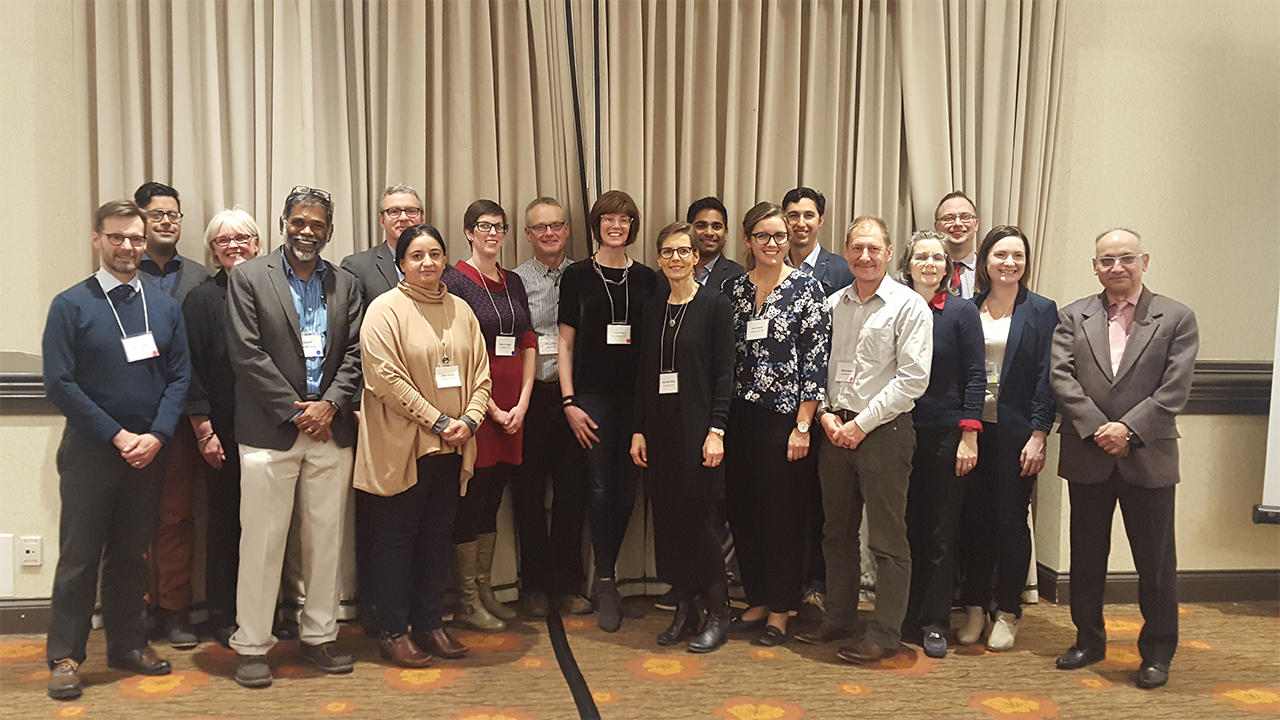Dianne Martin, a patient advisor in Saskatoon, was on hand Friday to celebrate with the 14 Saskatchewan physicians who successfully graduated as part of the first cohort of the province’s new Clinical Quality Improvement Program (CQIP). The 10-month course equips physicians to facilitate, coach, and teach quality improvement to other clinicians and managers. Wave 1 wrapped up November 18.
Martin, who brought a patient perspective to the program’s organizing committee, says she was moved when she read about each participant’s improvement project.
“I was blown away not only by your insights in recognizing the problem areas in our system that create frustration and hardships for the patients in your care, but by the passion I read in your proposals to create changes to make the system really work for your clients and their families.” (Dianne Martin, patient advisor)
See our Storify for highlights from Friday’s event
Modelled on the internationally recognized mini-Advanced Training Program at Intermountain Healthcare in Utah, CQIP combines classroom and online learning with individual coaching and a community of practice. The Saskatchewan program is funded through a partnership between the Ministry of Health and the Saskatchewan Medical Association (SMA); the Health Quality Council (HQC) provides in-kind support.
As part of their learning, every physician was required to develop and carry out an improvement project in their work setting. These hands-on projects ranged from reducing unnecessary preoperative tests and shortening wait times for pediatric psychiatry, to improving the management of COPD exacerbations and increasing offers of HIV tests. At the capstone event Friday, physicians gave 3.5-minute long presentations about their projects – called QITalks – and shared more details with guests and fellow graduates on large-format, conference-style posters. HQC broadcast the QITalks via WebEx, as part of its bi-weekly Kaizen Network meetings.
Watch a YouTube video of the QITalks
Dr. Philip Wright, from the Saskatchewan Cancer Agency, was part of the graduating class. He said CQIP has shifted his thinking.
“It has changed my practice by the realization that how we think we deliver quality medicine and how we actually deliver quality medicine can be different. By questioning and measuring our practices, we are able to more effectively improve the care and services we provide to patients.” (Dr. Philip Wright, CQIP graduate)
CQIP equipped participants with a variety of improvement tools. Dr. Erin Hamilton, a physician in Prairie North Health Region, said she put learning into action immediately. “The tools we learnt through workshops and online are applicable to large and small projects,” said Hamilton. “Usually I had use for them right away.”

Quality improvement in health care is a team sport. That, said Saskatoon Health Region’s Dr. Shaqil Peermohamed (pictured, at left) , was one of his key takeways from CQIP. “I have learned about the importance of collaboration and engaging other health care workers in order to produce effective and positive changes in our health care system.”
One of HQC’s strategic priorities is to build learning systems to spread knowledge on improving health care quality and safety. Gary Teare, Chief Executive Officer at the Health Quality Council, said developing clinician leaders of quality is a top priority for HQC.
“It is the most important way we can move our Saskatchewan health system into the 21st century and remake it for the benefit of patients – for our family, friends and neighbours and one day, ourselves.” (Gary Teare, Health Quality Council)
Assistant Deputy Minister Mark Wyatt brought congratulations on behalf of the Ministry. He said the health system needs physicians to not only participate in improvement efforts, but lead them as well. “Physician training in clinical QI skills and methodologies is key to advancing appropriateness of care in Saskatchewan and for moving to a high-performing health system,” said Wyatt.
Programs like CQIP are helping bring about a shift in the culture of Saskatchewan’s health care system, according to Dr. Susan Shaw, Director of Physician Advocacy and Leadership with the Saskatchewan Medical Association, and chair of the Health Quality Council. “There is discomfort required as we leave our old ways of working, to become a rapid-learning, patient centred system,” said Shaw. “I commend you (CQIP graduates) for stepping up and being brave.”
Applications for Wave 2 of CQIP closed October 31, 2017. The program received 40 applications, double the number received in the first round.



